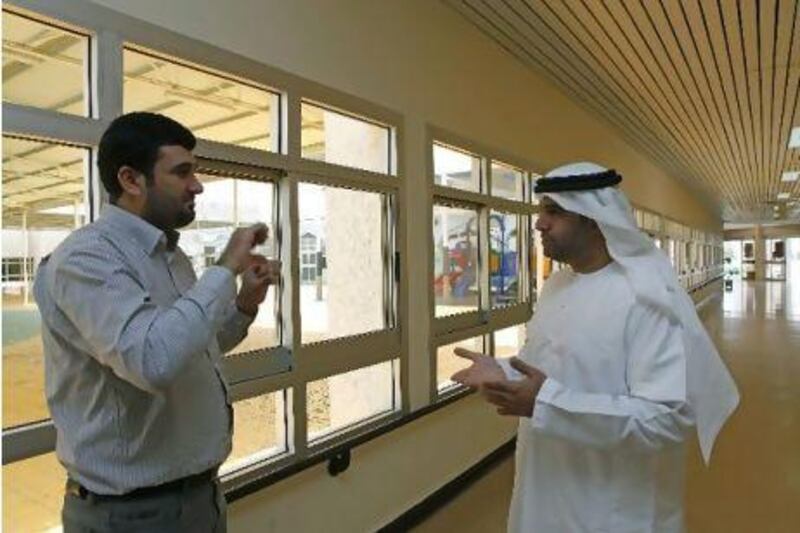AL AIN // Hamad Al Darmaki knows he has a big responsibility as the voice of the 600 or more people like him in the Emirates.
But there is one hitch: Mr Al Darmaki is impaired in his hearing and speech, and those who are needed to understand him do not.
MORE UAE NEWS: Our pick of today's top local news stories
Amy Winehouse: a little girl lost in Dubai
Within seconds of Amy Winehouse stepping on stage in Dubai last February, it was clear she was a wreck.
[ Read article ]
Tent safety rules set out for Ramadan
Safety regulations will be strictly enforced for Iftar tents with the aim of full compliance from residents, hotels and businesses.
[ Read article ]
UAE's Pakistani schools receive poor report card
Many head teachers lack the motivation - and the money - to improve standards.
[ Read article ]
[ MORE UAE NEWS ]
A shortage of sign language translators in the country means an already limited world is even more so. Opportunities most take for granted - education, television, recreation - are a luxury for a few, not a right for all.
One of Mr Al Darmaki's projects is to put together an Emirati sign language dictionary with the help of teachers and the deaf community.
He has already established the country's first football team for the hearing impaired, and received the Abu Dhabi Award for community service in 2006.
Mr Al Darmaki's latest goal is to raise awareness that the country's deaf "can".
"They can work," he says. "I want companies to realise we can help build the society here. We want to show the abilities of the deaf, not focus on their disabilities."
Mr Al Darmaki, 38, has travelled to the US and Canada for the cause, researching rights and facilities for the deaf so he can be well versed when dealing with UAE policymakers.
"I will succeed," he says.
He has just secured office space for the National Association of the Deaf, which he established a year ago, at the Zayed Higher Organisation for Humanitarian Care, Special Needs and Minors Affairs in Al Ain.
It has not been easy. Funding is hard to find and qualified staff even harder.
At 14, Hamad travelled from his family's home in Al Ain to Abu Dhabi, where he received basic education at the special needs centre. There was nothing available in Al Ain at the time. From there, he went to the American School for the Deaf in Connecticut where he received a more advanced education and learnt US sign language.
It was like starting again, he says, going back to school with children as young as four or five.
At home he had simply muddled through, with his family making up its own system of communication.
"Learning sign language made communication much easier," Mr Al Darmaki says through a translator.
"After that I could communicate much better with people who knew sign language like my teachers and I felt I could more easily depend on myself, but in society it was still difficult." Mr Al Darmaki's two children, Fatima, 7, and Sultan, 7 months, both have their hearing. He feels happy they have opportunities he did not.
He recalls a time waiting to see a doctor in hospital and no one there knew sign language, nor could they call on someone who did.
"I was sitting there and I didn't know they had called me," he says. "They hadn't looked at my records to see I was deaf so I sat there while others went before me. My papers just said special needs, not deaf."
Mr Al Darmaki's English language translator, Salma Al Tamimi, says: "There should be many more translators in places like this, in courts, hospitals. How can they manage? They need many more people to help them be understood."
Ms Al Tamimi began working with Al Ain's deaf community after graduating from university. She trained as a specialist for six months at the Zayed Higher Organisation, and from there could train others.
The centre has 22 deaf people, aged from 9 to 21, learning subjects including Arabic and maths. But there are only four qualified staff to teach them.
"More people must know sign language," Ms Al Tamimi says. "When I first started volunteering I just thought about people in wheelchairs or the blind, but with them you can communicate.
"For deaf people, they have their own language and culture. Sometimes when I teach my students, I cry. They don't know anything I knew at their age. They don't know about wars, films, flowers, clothes. Their world is so small."
She says Mr Al Darmaki's chosen part as a role model and pioneer is vital for the country.
"They come to him with their problems," she says.
"Everything from travelling to problems at work.
"It's very important for the deaf community to have a role model, to see that Hamad has studied, has travelled - to see that they can too."





